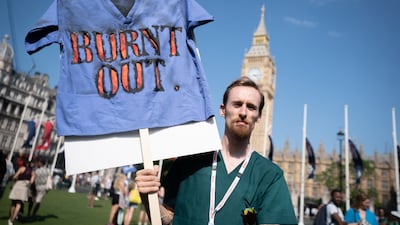In a book published back in 2012 called Britannia Unchained, future UK prime minister Liz Truss and her Conservative party colleagues characterised British workers with these words: “Once they enter the workplace, the British are among the worst idlers in the world. We work among the lowest hours, we retire early and our productivity is poor. Whereas Indian children aspire to be doctors or businessmen, the British are more interested in football and pop music.”
Insulting workers as lazy in the country that you hope to lead was a peculiar political strategy for Ms Truss, but somehow it worked. A decade after the book appeared, she became prime minister (famously lasting just seven weeks in office).
Those words about British “idlers” have an echo right now. A policy initiative from Ms Truss’s successor, Prime Minister Rishi Sunak, seeks to change the way in which family doctors assess whether a person is fit for work. Those declared unfit may qualify for taxpayer-funded state benefits. The others either find a job or receive no state money.

Mr Sunak attacked what he called the UK's “sick note culture” suggesting that not working for some is a “lifestyle choice”. “Hardworking people” are paying higher taxes to support a “spiralling” welfare bill.
There is nothing new in this. Politicians worldwide, particularly on the political right, often claim that lazy scroungers benefit from the hard work of you and me. Back in the 1970s, then-US presidential candidate Ronald Reagan used the term “welfare queens” to stigmatise some women – black women in particular – who, he claimed, were paid taxpayers’ money to do nothing.
Of course, some people do abuse the system, but this same trope reappears time after time in the mouths of politicians who clearly believe that it’s a winner with voters. But what is their solution?
Mr Sunak says that if his party wins the next general election, he will make it harder for patients to obtain a doctor’s sick note. He will take decision-making on fitness to work away from overstretched doctors, in a proposed “crackdown” on benefit fraud. He does not “dismiss or downplay” mental ill health, but we need to be “honest about the risk of over-medicalisation of everyday challenges”.
So, who will decide if you are too sick to work or are just lazy, if it’s not your doctor? Mr Sunak says it will be unspecified “specialist work and health professionals who have the dedicated time to provide an objective assessment of someone’s ability to work and the tailored support they need to do so”. Well, possibly.
It’s certainly true that since the coronavirus pandemic, there has been a bump in sickness of one sort or another in the British workforce. According to the Office for National Statistics, “an estimated 185.6 million working days were lost because of sickness or injury in 2022; this level was a record high, but the number of days lost per worker, at 5.7, was not”. There was more recently, in February, a record unemployment high of 2.8 million people out of work.
Mr Sunak concludes that “there’s nothing compassionate about leaving a generation of young people to sit alone in the dark before a flickering screen watching as their dreams slip further from reach every single day”. That is certainly true, although whether these words are relevant as a realistic characterisation of young British people in 2024 is debatable.
Employers do report a worker shortage. That is one reason immigration to the UK is so high. But the key question is whether Mr Sunak has hit on a problem requiring a change in the kind of people who sign “sick notes” or whether – as with the Britannia Unchained slur on workers – all this is just standard political rhetoric in the run-up to an election.
Scope, a British disability charity, says that Mr Sunak is mounting “a full-on assault on disabled people” that was “driven by bringing costs down rather than how we support disabled people”. Mental health charities also raise questions about the Sunak announcement. Others say that the real problem is a lack of training, lack of an educated workforce, lack of well-paying jobs, and difficulties in obtaining hospital treatment and medical care for those “signed off” as sick.
There is, in other words, no magic bullet solution. But as I travel round the country talking to diverse audiences – last week I was in Yorkshire – I hear some very different stories, and they focus on money. The people I meet often speak of hardship and the rising cost of living. Some say hard work does not pay enough.
A skilled craftsman I spoke with recently told me that he goes to the local supermarket just before closing time every Saturday night because that’s when they discount meat and other costly foods. He works hard – often six days a week – but finds paying the bills increasingly difficult.
Instead of dividing us into “hardworking” people and “idlers” or “welfare queens”, maybe governments could figure out how to pay workers a fair and decent living wage for a hard day’s work. I’d vote for that.


